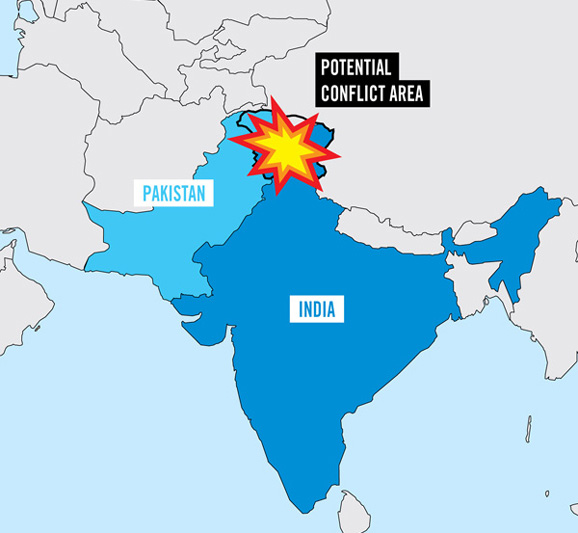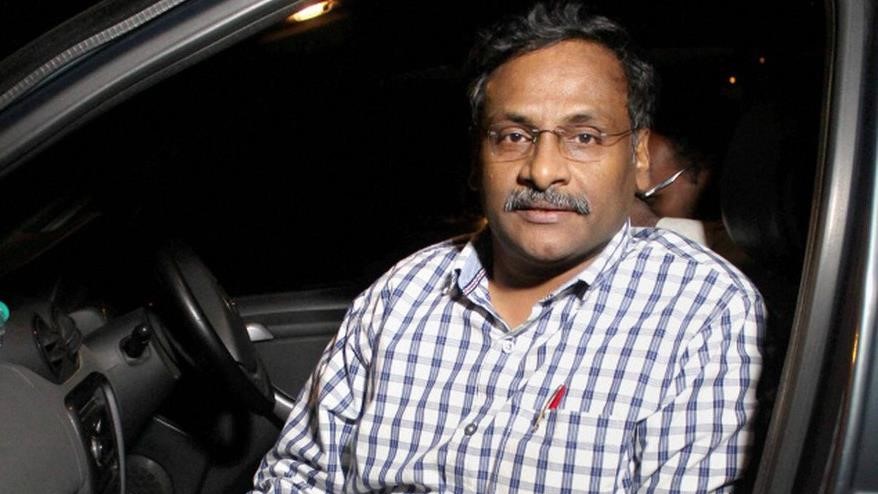NOVANEWS

Sajjad Shaukat
Pakistan is a grave victim of water scarcity, because of being on lower riparian in relation to the
rivers emanating from the Indian-Held Kashmir (IHK). India has never missed an opportunity to
harm Pakistan since its inception; it is creating deliberate water shortages for Pakistan with the
aim to impair Pakistan agriculturally. Historically, India has been trying to establish her
hegemony in the region by controlling water sources and damaging agricultural economies of her
neighbouring states. India has water disputes with Pakistan, Nepal and Bangladesh. Indian
extremist Prime Minister Narendra Modi who has given the concerned departments to continue
construction of dams has ordered diverting water of Chenab River to Beas, which is a serious
violation of the Indus Water Treaty of 1960. Therefore Pak-India water dispute has accelerated.
In this regard, an article By: Zofeen T. Ebrahim, Joydeep Gupta (Co-Authors) under the caption,
“India resists World Bank move to resolve Indus Water Treaty dispute”, published in The Third
Pole and reproduced-updated by a Pakistan’s renowned daily on January 6, 2017 is notable.
Zofeen T. Ebrahim and Joydeep Gupta wrote, “India has asked the World Bank not to rush in to
resolve a dispute with Pakistan over the Kishanganga and Ratle hydropower projects. Indian
officials told a World Bank representative in New Delhi on January 5 that any differences over
the projects can be resolved bilaterally or through a neutral expert. Pakistan has objected to the
projects–being built by India in Jammu and Kashmir–on the grounds that they violate the 1960
Indus Waters Treaty (IWT) between the two countries. After India rejected the charge, Pakistan
has gone to the World Bank–the designated IWT mediator.”
They indicated, “Islamabad has also asked the United States (US) government to intervene, and
has added the component of water security to the China-Pakistan Economic Corridor (CPEC)
agreement. Of the rivers in the Indus basin, the Indus and the Sutlej start in China and flow
through India before reaching Pakistan. The other four rivers–Jhelum, Chenab, Ravi and Beas –
start in India and flow to Pakistan”.
The writers pointed out, “The Kishanganga project is on a tributary of the Jhelum, while the
Ratle project is on the Chenab. The State Department in Washington has already said it wants
India and Pakistan to resolve all outstanding issues bilaterally, a route favoured by India.”
Zofeen T. Ebrahim and Joydeep Gupta elaborated, “As the dispute flared up, the World Bank
had recently suspended all proceedings–the setting up of a court of arbitration or the appointment
of a neutral expert. On January 5, World Bank representative Ian H Solomon met officials of
India’s External Affairs and Water Resources ministries in New Delhi in an effort to break the
deadlock.The Indian delegation, led by Gopal Baglay, Joint secretary in the Ministry of External
Affairs, made a detailed a presentation on the two projects to support their argument that neither
project violated the IWT. After the meeting, a government official told journalists that the Indian
side had described the objections raised by Pakistan as “technical”, and therefore they would be
best resolved by a neutral expert.”
They wrote, “Pakistan has dismissed this suggestion earlier, and is seeking a full court of
arbitration. The World Bank had agreed to a court of arbitration and then to the appointment of a
neutral expert, leading to objections by both countries. That was when both processes were
suspended. Explore: World Bank pauses dam arbitration to ‘protect Indus Waters Treaty.’ At the
January 5 meeting, Solomon did not raise any question on the designs of the two projects,
according to the Press Trust of India news agency. Instead, he explored ways to resolve the
dispute. With nothing decided, the World Bank official is going from New Delhi to Islamabad to
continue this effort. The official added that India is fully conscious of its international
obligations and is ready to engage in further consultations to resolve the differences regarding
the two projects. Under the IWT, India is allowed only non-consumptive use of water from the
three western rivers in the Indus basin–Indus, Jhelum and Chenab.”
The co-authors mentioned, “The Kishanganga and Ratle projects are on the western rivers. They
are run-of- the-river hydropower projects that do not hold back any water, though Pakistan’s
objection is about the height of the gates in the dams from which water is allowed to flow
downstream. The three eastern rivers–Ravi, Beas and Sutlej–are reserved for the use of India.
Meanwhile, in Pakistan. The Pakistani government approached the World Bank last September,
saying the design of the Kishanganga project was not in line with the criteria laid down under
IWT, and sought the appointment of a court of arbitration. Since the Kishanganga project has
been going on for years, the “inordinate” delay by Islamabad to approach the World Bank would
give India more time to complete its projects, Jamait Ali Shah, former Indus Water
Commissioner on behalf of the Pakistani government, told thethirdpole.net”.
Their article pointed out, “However, Pakistan’s Finance Minister Ishaq Dar wrote to the World
Bank on December 23, stressing that it was not withdrawing its request to set up a court of
arbitration. This was followed by a call from the outgoing US Secretary of State John Kerry to
Dar, saying that the US would like to see an amicable solution to the transboundary water row.
Karachi-based newspaper…quoted diplomatic observers in Washington to say, “seriousness of
this dispute, particularly the fear that it may harm the treaty, forced Mr. Kerry to make this call.”
The writers explained, “For a while now Pakistan has also wanted to bring China into the picture.
At the sixth meeting of the Joint Cooperation Committee (JCC) of the CPEC which was held in
Beijing on December 29, a special group on water storage was formed to pre-empt any “severe
water crisis” impacting economic and food security of Pakistan, an official statement said. After
a Chinese delegation visits Pakistan later this month, the JCC – the highest policy-making forum
of the CPEC – may consider including the Diamer-Bhasha dam into the CPEC agreement.
Planned at an estimated cost of around USD 15 billion, if Pakistan succeeds in getting the dam
financed under CPEC, planning and development minister Ahsan Iqbal would consider it a
“landmark achievement”. Both the World Bank and the Asian Development Bank have refused
to lend money to Pakistan for this hydropower project. Pakistani experts react leading lawyer and
former federal law minister, Ahmer Bilal Soofi termed the inclusion of water security into CPEC
essentially a |political choice for Pakistan and China” though the issue does not “squarely fall
within the otherwise commercial mandate of CPEC”.
Zofeen T. Ebrahim and Joydeep Gupta wrote, “Speaking to thethirdpole.net, Soofi said Pakistan
and China need to exchange notes on a “contradicting state practice of India as an upper riparian
to Pakistan and a lower riparian to China, that will help both the states to confront India.” He
further added that Pakistan should raise its voice at an international level that “India’s building of
reservoir and fully utilising the water storage capacity under the treaty poses a serious threat to
Pakistan in particular backdrop of India’s present posturing as it improves India’s capability to
manipulate water flows into Pakistan.” This was echoed by former commissioner Shah who said
the international community should be duly briefed about the “dilution of the violation of the
provisions of the treaty” by India. At the same time, he said both countries should continue to
work closely and quietly to resolve the grievances and find a middle ground”.
They added, “The recent stance by India where it “lobbied aggressively and influenced” the
World Bank, he feared, had further undermined the already “fragile” treaty. “The WB needs to
take the right action–which is to act as arbitrator in this matter, as it has done before,” pointed
out water expert Simi Kamal.The reason why the IWT, 74 pages long with 12 articles and 8
annexures and has no expiry date, has worked so far, she said was partly because the Bank acted
as a third party. “The Bank needs to maintain this role and not back off now, when its arbitration
role is most required in the face of a belligerent Indian government.”
According to the writers, “Kamal further said the solution lay not in the pause by the Bank “or
for hawks to call for dismantling the treaty”, but for both governments to act responsibly and for
the Bank to play its role in "containing adventurism by either government–in this matter the
Indian government”. Shah also felt when Pakistan plans to proceed with such cases, it never does
its homework thoroughly and therefore always appears the weaker party. The same was endorsed
by noted economist Kaiser Bengali when he told thethirdpole.net that he found “the intellectually
deficient and politically inane manner in which Pakistan has been pursuing the matter”, criminal.
Bengali had little confidence in the Pakistan IWT team. He said, “It has no strategy on dealing
with water issues with India. Pakistan’s chief negotiator for more than a decade and a half had
limited intellectual capacity to lead on such a strategically life and death issue,” he said”.
They indicated, “He said Pakistan keeps harping on the "spirit" of the agreement. “Four decades
after a treaty is signed, what matters is the letter of the print, not the spirit of the time when the
document was signed.” Bengali believed India was not violating the letter of the agreement.
“India has been building power plants on western rivers, but not diverting any water”. Nor, he
said, were Pakistan’s contentions on the design "substantive enough to warrant a full scale
confrontation”. He also observed, like Shah, that differences can and should be resolved in a
more “low key” manner. He feared that since India was not violating the treaty per se, if Pakistan
does take the latter to court, it will meet the same fate as the Baglihar Dam case of 2007”.
Zofeen T. Ebrahim and Joydeep Gupta maintained, “While Indian officials maintain that they are
sticking to the IWT, the government has hardened its stand in recent months after attacks on
Indian Army camps in Kashmir by suspected militants. (Read: South Kashmir's role in anti-India
struggle) New Delhi had earlier said it was setting up a task force to examine what projects it
could undertake in the three western rivers of the Indus basin under the ambit of the IWT. In the
last week of 2016, the government announced that the task force would be headed by Nripendra
Mishra, principal secretary to Indian Prime Minister Narendra Modi.”
Nevertheless in light of the above article, it is mentionable that since the 9/11 tragedy,
international community has been taking war against terrorism seriously, while there are also
other forms of bloodless wars, being waged in the world and the same are like terrorism. Political
experts opine that modern terrorism has many meanings like violent acts, economic terrorism
etc., but its main aim is to achieve political, economic and social ends. Judging in these terms,
Pak-India water dispute which has become serious needs special attention of the US and other
major powers, as India remains stern on her illegitimate stand in this respect.



